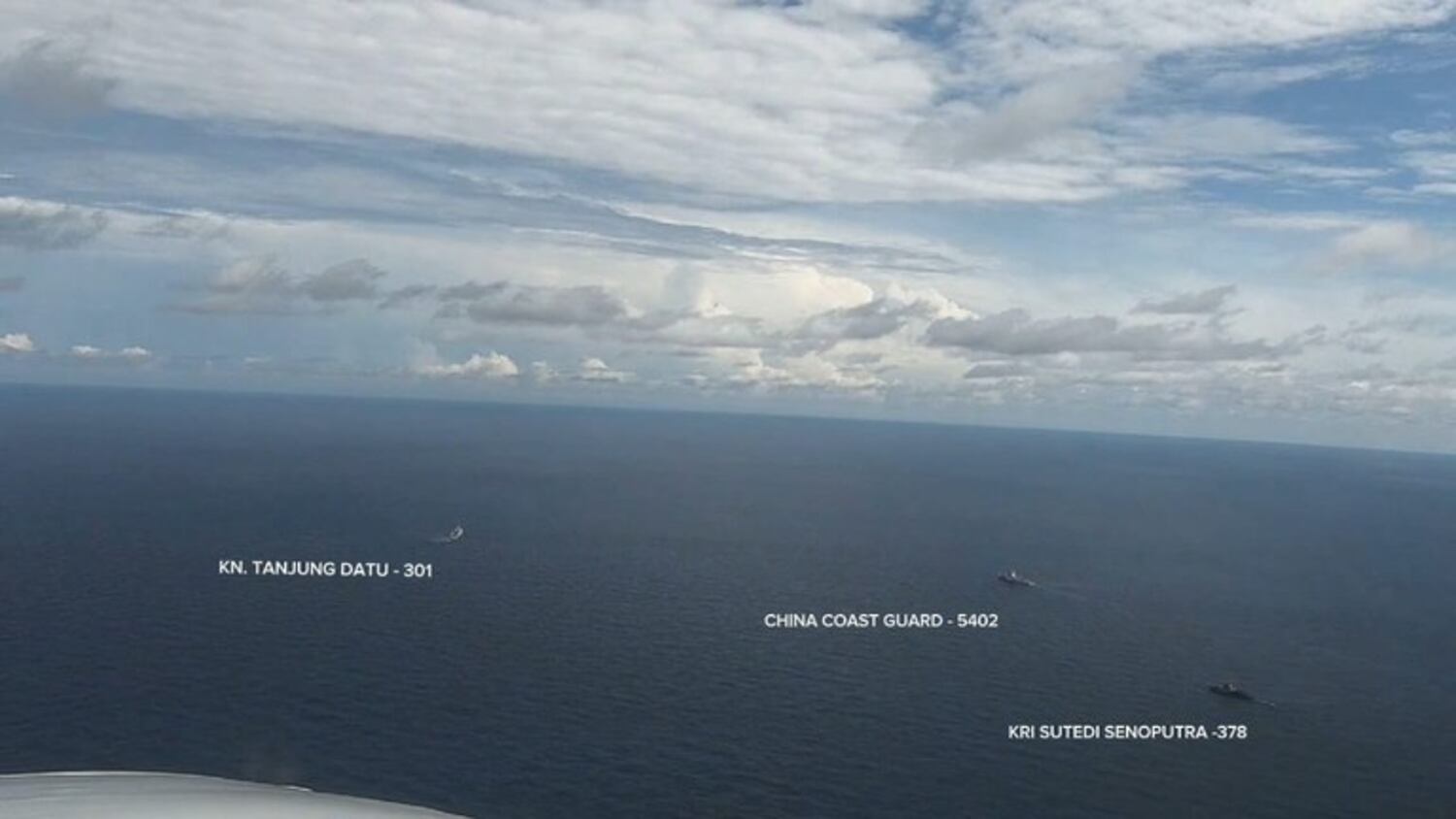Indonesia’s foreign minister on Monday responded to concerned lawmakers that a recent joint maritime development deal with China did not recognize Beijing’s claims in the South China Sea, but analysts said his explanations were a weak justification for a serious error.
A joint statement issued after a meeting last month in Beijing between new Indonesian President Prabowo Subianto and Chinese President Xi Jinping said the two countries had reached an “important common understanding on joint development in areas of overlapping claims.”
However, Jakarta had consistently rejected China’s sweeping claims in the contested South China Sea, which encroaches into Indonesia’s exclusive economic zone (EEZ) north of the Natuna islands.
During a parliamentary hearing on Monday, Indonesian legislator Sukamta said these Chinese claims, which are represented on its maps by a so-called nine-dash line, are changed by Beijing as it pleases.
“Previously it was nine dashes, now it’s 10,” said the legislator who goes by one name.
“We must be firm in asserting our rights. … Without clear boundaries, we risk being manipulated by China,” he said.
Sukamta called for more clarity on the geographical scope of the development agreement mentioned in the text of the joint statement issued after Prabowo met with Xi.
China’s claims in the South China Sea overlap those of five Asian nations and Taiwan.
And in what many analysts back then saw as a political message, Jakarta in 2017 renamed the southern reaches of the South China Sea the North Natuna Sea to emphasize its sovereignty over those waters encompassing natural gas fields.
Another Indonesian lawmaker, Farah Puteri Nahlia, echoed Sukamta’s concerns.
“We all understand that China is Indonesia’s key trading partner, but we should not become overly dependent,” Farah said.
“What steps will the foreign ministry take to ensure we maintain our non-aligned stance? We must aim for not only free trade but fair trade, while safeguarding our EEZ amidst these tensions.”

Already, during the first week of Prabowo’s presidency in October, Indonesian naval and coast guard ships confronted and expelled a Chinese coast guard ship from its EEZ in the North Natuna Sea on three occasions.
China has in recent years also opposed Indonesia’s oil and gas exploration activities in its EEZ.
This agreement comes amid escalating tensions in the South China Sea region, a crucial maritime route for global commerce.
‘50% of nothing is still nothing’
Foreign Minister Sugiono responded to lawmakers’ concerns saying that the joint statement did not recognize China’s nine-dash line.
“The text itself is clear – it does not imply any such recognition,” Sugiono, who goes by one name, told lawmakers.
“The specifics, including the locations and terms of the cooperation, have not yet been defined. This is merely a preliminary agreement and the details will be worked out later.”
He also said joint cooperation was President Prabowo’s plan “as part of efforts to reduce tensions and maximize resource utilization,” and had been discussed with leaders of neighboring countries.
“The core principle is that President Prabowo has directed us to enhance cooperation with our neighboring countries for mutual benefit, while upholding Indonesia’s sovereignty,” Sugiono said.
He said Indonesia’s position on sovereignty remained unchanged, noting that the joint development agreement would be guided by international law and Indonesia’s interests.
“Indonesia’s stance remains unchanged, as do the positions of its neighbors. However, the principle stands: 50% of nothing is still nothing,” Sugiono further said.
“If there is no way to derive benefit from these resources for our nation’s interests, it is better to collaborate while strictly adhering to fundamental principles and maintaining sovereignty.”
‘Little room for multiple interpretations’
For foreign policy analyst Mohamad Rosyidin, these explanations from Sugiono did not explain the crux of the problem – why the joint statement included the phrase “overlapping claims.”
“The statement is merely an excuse for the blunder in the joint statement. It’s unlikely the government will admit to that mistake,” Rosyidin, of Diponegoro University, told BenarNews, an RFA-affiliated news service.
“Just because we want to collaborate with China in the South China Sea doesn’t mean Indonesia should shift from a rule-based approach to pragmatism.”
The Indonesian government should remain consistent with the nation’s stance on the South China Sea, he said.
“The real problem is that Chinese vessels frequently enter Natuna waters. However, this does not mean there is an overlapping claim; it is a violation of sovereignty by China.”
Another international relations analyst, Muhammad Waffaa Kharisma, concurred.
“I am among those who believe there is little room for multiple interpretations of the joint statement between President Prabowo and President Xi Jinping regarding overlapping claims,” he told BenarNews.
“Regardless of how it is responded to or justified, I see the initial phrasing in the agreement as a concession by Indonesia, yielding or compromising with China.”
He said the problematic text could have an effect on Indonesia, if not immediately then in the near future.
“Whether intentional or not is a secondary matter. Intentional or not, there will be impacts on Indonesia’s sovereign rights. … especially if there are no serious efforts for reversal through follow-up measures or statements,” he said.
Such a concession may ease any tensions between Indonesia and China, but it strengthens Beijing’s hand and gives the impression Jakarta is yielding to the major power, he said.
“Currently, the foreign minister and the Ministry of Foreign Affairs are in damage-control mode. The potential for conflict and unilateral claims are two sides of the same coin,” he said.
“The only positive aspect is that the initiative has not yet materialized, as mentioned by the foreign minister.”
BenarNews is an RFA-affiliated online news service.
This content originally appeared on Radio Free Asia and was authored by Pizaro Gozali Idrus for BenarNews.
This post was originally published on Radio Free.